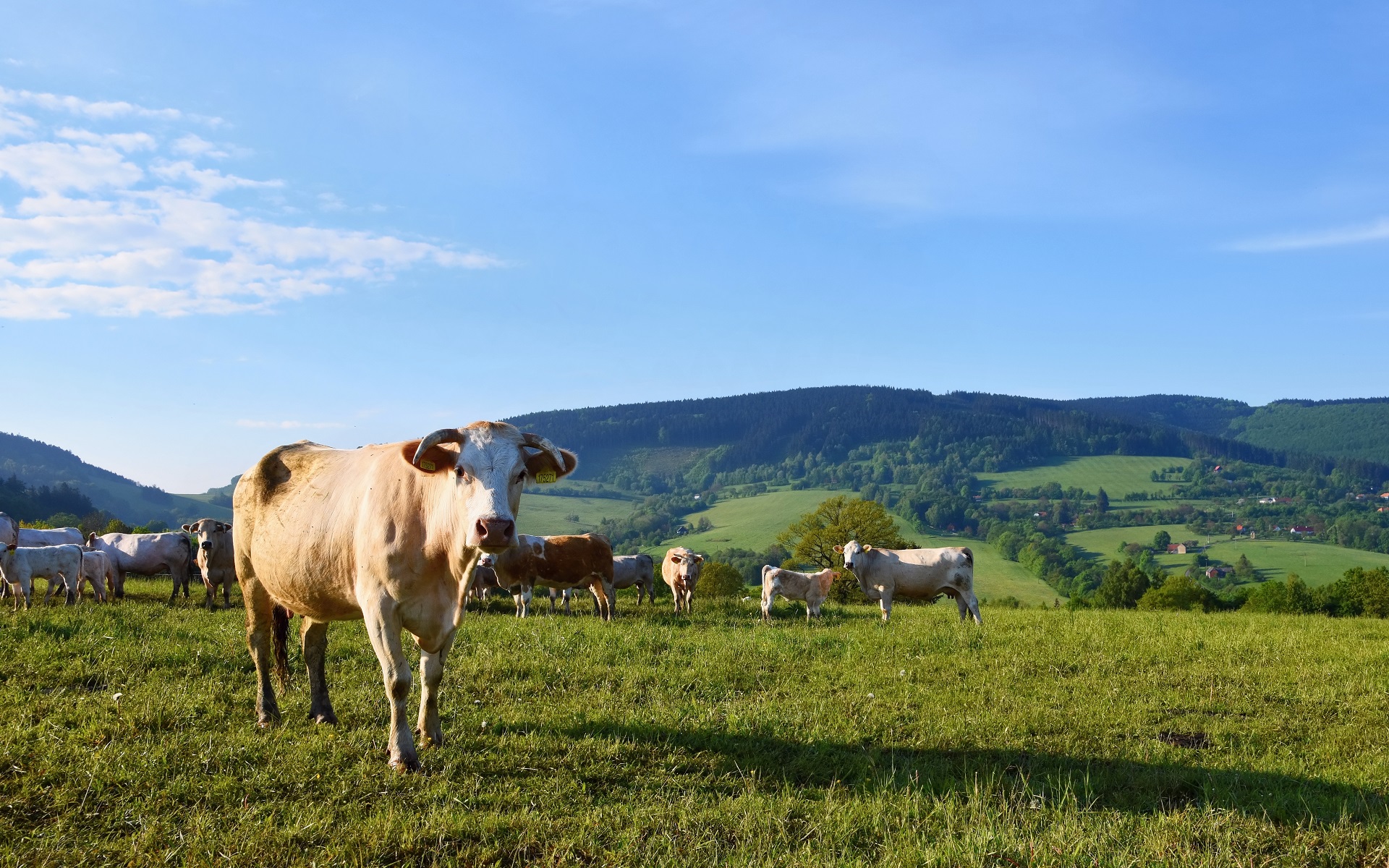Bovine colostrum, otherwise known as beestings, is the milk produced in the first few days after birth. It demonstrates lots of nutritional value, with ingredients such as whey protein, casein, fats and oligosaccharides , as well as various bioactive substances to ensure proper development of calves. There are reports that bovine colostrum has the effect of stimulating and supporting the immune system in teenagers, adults and the elderly alike. It reinforces both the innate and acquired immune systems, therefore showing a comprehensive effect.
Immune-enhancing components of colostrum
Immunoglobulins (antibodies)
The main components that enhance immunity are immunoglobulins (antibodies), which are glycoproteins produced by the B cells of the immune system, specifically recognizing and binding antigens present on bacteria and viruses. Antibodies are divided into classes that differ in terms of their biological, physicochemical and immunological properties. IgG, IgA and IgM predominate in the bovine colostrum, with IgG making up about 80-85% of the content. IgG is responsible for providing passive immunity, and IgM is the determinant of antiseptic immunity. High concentrations of IgA and IgG help protect the mucosa and increase resistance to respiratory and gastrointestinal infections. The leukocyte content in colostrum, such as lymphocytes B and T, neutrophils and macrophages, results in a direct effect on microorganisms.

Cytokines
Bovine colostrum contains plenty of cytokines, such as:
- Insulin-Like Growth Factor (IGF)
- Epidermal Growth Factor (EGF)
- Transforming Growth Factor (TGF)
- Vascular Endothelial Growth Factor (VEGF), etc.,
which are produced primarily by cells of the immune system, thus having strong immunomodulatory properties. The EGF cytokine is extremely important in maintaining immunity and intestinal health, as it participates in the regulation of cell growth, proliferation, survival, apoptosis and differentiation, and protects the integrity and balance of the intestinal barrier. TGF-β, on the other hand, as a regulatory cytokine, is involved in regulating lymphocyte proliferation, differentiation and survival to maintain immune tolerance. Thanks to a natural growth promoter such as IGF, it is possible to promote intestinal development and proper nutrient absorption, ultimately improving the body’s immunity.
Vitamins and minerals
Colostrum has a high concentration of vitamins (A, D, E, K and B-group vitamins) and minerals (including calcium, copper, iron, magnesium, zinc), which play an important role in supporting the defense mechanisms.
Lactoferrin, lactoperoxidase and lysozyme
Substances such as lactoferrin, lactoperoxidase and lysozyme are responsible for the antimicrobial properties of colostrum, playing an important role in reinforcing the body’s immunity. Lysozyme works by hydrolyzing and killing bacteria through cell wall peptidoglycan. Lactoferrin has antioxidant, anti-inflammatory, antibacterial, immunomodulatory and antineoplastic properties. The antimicrobial effect of lactoferrin means inhibiting the growth of pathogenic bacteria, viruses, protozoa and yeast, as well as preventing the attachment of pathogens to epithelial cells, and promoting the maintenance of intestinal stability. Besides, lactoferrin is important in intestinal iron uptake, phagocyte activation and immune response, and its receptors are found in intestinal tissue, lymphocytes, monocytes, and macrophages, among others.
Oligosaccharides (prebiotics)
Bovine colostrum also contains oligosaccharides, which constitute valuable prebiotics, or in other words: nutrients for beneficial intestinal bacteria, and have the ability to inhibit the pathogenic bacteria adhesion to the intestines. As we know, the state of the gut microbiota has a significant role in building immunity, therefore probiotic and prebiotic support is invaluable. It has been proven that colostrumfavorably modifies the intestinal microbiome and reduces intestinal permeability (decreasing plasma concentrations of zonulin and endotoxins).
Studies showing beneficial effects of colostrum on immunity
It has been demonstrated that a six-week supplementation of colostrum in preschool children prevents and alleviates upper respiratory tract infections, and these protective properties can last up to 20 weeks. Using 20 g of this ingredient per day for six weeks in regularly training adolescents resulted in a significant increase in the immunoglobulin A (slgA) levels in their saliva, suggesting that bovine colostrum may be involved in mucosal immunity modulation. Another clinical trial showed that the expression of various pro-inflammatory factors (CRP, IL-6 and TNF-α), was significantly reduced in the elderly after consuming skimmed young cow milk. Having considered the foregoing, bovine colostrum can reduce the severity of inflammation and delay immunity decrease caused by aging in the elderly.

What to look for when choosing a formula?
The quality and composition ofcolostrum are affected by numerous individual, and environmental factors, as well as the manner of subsequent processing. IgG level is used as a key indicator to assess the quality of this raw material, wherein the IgG content should be ≥50 g/L. High IgG levels are ensured by bovine colostrum being collected immediately after birth, as its composition changes with each hour, and its biological value and nutritional value decrease over time.
Heat treatment and processing of colostrum can easily result in immunoreactive content loss. Heat-sensitive components can be protected from degradation by using spray-drying or freeze-drying (drying at lower temperatures and in vacuum). In addition, drying colostrum allows for long storage periods. Its production may involve using various additives, such as preservatives, coloring substances, therefore it is better to pay attention to whether the manufacturer emphasized the absence of harmful additives in the product. In conclusion, it is advisable to choose a product with its ingredients collected from cows as early as possible, and having undergone proper processing, i.e. freeze-drying.
How to use bovine colostrum?
It is suggested to take colostrum on an empty stomach, for better absorption. Dosage depends on the content of the product in the capsule or powder, the manufacturer’s recommendations, as well as age. You should not take this supplement if you have hypersensitivity to milk proteins and lactose. Apart from that, it is safe to use.
References:
Arslan A, Kaplan M, Duman H, Bayraktar A, Ertürk M, Henrick BM, Frese SA, Karav S. Bovine Colostrum and Its Potential for Human Health and Nutrition. Front Nutr. 2021 Jun 21;8:651721.
Playford RJ, Weiser MJ. Bovine Colostrum: Its Constituents and Uses. Nutrients. 2021 Jan 18;13(1):265.
Sangild PT, Vonderohe C, Melendez Hebib V, Burrin DG. Potential Benefits of Bovine Colostrum in Pediatric Nutrition and Health. Nutrients. 2021 Jul 26;13(8):2551.
Davison G. The Use of Bovine Colostrum in Sport and Exercise. Nutrients. 2021 May 24;13(6):1789.
Duan H, Sun Q, Chen C, Wang R, Yan W. A Review: The Effect of Bovine Colostrum on Immunity in People of All Ages. Nutrients. 2024 Jun 25;16(13):2007.
Puppel, K.; Gołębiewski, M.; Grodkowski, G.; Slósarz, J.; Kunowska-Slósarz, M.; Solarczyk, P.; Łukasiewicz, M.; Balcerak, M.; Przysucha, T. Skład i czynniki wpływające na jakość siary bydlęcej: przegląd. Zwierzęta 2019 , 9 , 1070.
Linehan K, Ross RP, Stanton C. Bovine Colostrum for Veterinary and Human Health Applications: A Critical Review. Annu Rev Food Sci Technol. 2023 Mar 27;14:387-410.


